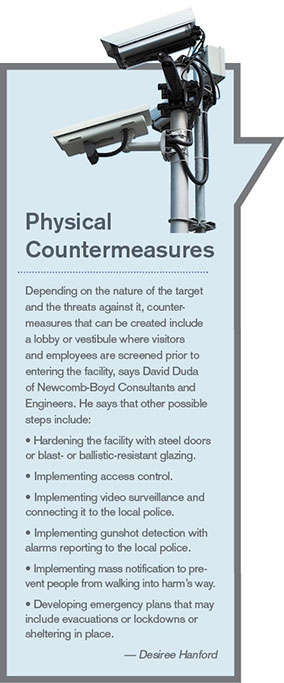ISIS: Another In a Growing List of Threats To Consider in Security Plans
First part of our 3-part August cover story on why understand the threats can help prepare FMs for uncertainty.
A nightclub in Orlando. A workplace in San Bernardino. A train station and airport in Brussels. A café in Paris.
These places have little in common except for one thing: They were all targets of terrorists that associated themselves with ISIS. The risk posed by ISIS, experts say, is another in a growing list of threats that facility managers have to consider in formulating security plans. While the nature of the threat from ISIS makes planning difficult, there are steps that facility managers can take to improve preparedness.
David Duda, associate partner of security at Newcomb-Boyd Consultants and Engineers, notes that U.S. Assistant Attorney General John Carlin said on CNN in March that there were 60 terrorist cases prosecuted in the United States last year, more cases in any year since 2001. He added that Peter Bergen, CNN’s national security analyst, said in a CNN Opinion Blog that the FBI is conducting ISIS terrorist investigations in all 50 states and that there are about 900 terrorism investigations in progress, the majority of which are ISIS-related.
Lone Wolves
Unlike other terrorist organizations, which use a large number of individuals to carry out plans, ISIS encourages small groups and homegrown individuals — so-called lone wolves born in the United States — to act independently when potential opportunities arise. It’s that aspect that is the most significant concern to Sean Ahrens, a security consulting practice leader for Jensen Hughes. While there tends to be a higher level of success for larger groups with multiple people involved, the larger number of individuals involved also means that information is more easily leaked.
“The small groups are much more difficult to detect and as a result, they can be successful by the opportunity just presenting itself,” Ahrens says. “So our inability to detect smaller groups makes them a large threat, and the incidents spawned by these attacks replicate themselves.”
The attack at the nightclub in Orlando, Duda says, is a “powerful example” of how much harm a lone wolf can do when attacking a soft target.
ISIS is also very significant because of where it started — Iraq — and how it subsequently grew its presence to countries that include Nigeria, Libya, Yemen, Afghanistan, Pakistan, Syria, Israel and more, McCann says. The groups are well off in terms of financial strength and are able to place people where they want them around the world, he notes.
Not The Only Threat
With all the concerns about an attack by ISIS, experts note that it’s just one of many security threats. For example, says David McCann, principal security consultant with the Wivenhoe Group, Al-Qaeda is still a meaningful force. It is also established in many countries and has affiliations in the United States.
It’s unclear to federal agencies and law enforcement why Al-Qaeda and ISIS have held off in the United States the types and scale of attacks they have done elsewhere in the world, McCann says.
“It could be because it’s hard to get explosives and weapons that they use into the country,” he says. “But frankly, it has only slowed them down. It hasn’t changed the equation. It could also be that they are patient, and they are waiting for us to be off our guard. That’s the flaw in security worldwide. People easily forget and put their guards down.”
Related Topics:















